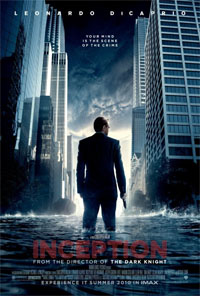 Inception (2010, Dir. Christopher Nolan):
Inception (2010, Dir. Christopher Nolan):
Eames: You mustn’t be afraid to dream a little bigger, darling.
[Pulls out a grenade launcher]
Of today’s big-budget filmmakers, Christopher Nolan has always been the most prosaic, in both the positive and negative senses of the word. Watching a Nolan film can stir a strange melange of reactions — one appreciates the brainy themes he touches upon even as he plays within the confines of genre (superhero flicks with his Batman films, ostensible mystery-thrillers like Memento and Insomnia), the sly literary flourishes, the way his narratives can coil back on themselves, our sense of reality called into question with a simple sleight of hand. And yet he’s probably one of the squarest directors out there, still a relative neophyte when it comes to mastering cinematic language. Take for example the ferryboat climax of The Dark Knight, wherein the Joker sets the table for an awful moral dilemma with hundreds of innocent and not-so-innocent lives at stake, and instead of a white-knuckle sequence, we get something staged and shot in the clunkiest manner possible — it’s like watching a balloon tied to a lead weight.
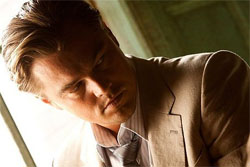
So we now arrive at Inception, a project supposedly a decade in the making, and whatever the concept might have been in its early days (one wonders what kind of film it would have been had it been made around the time of Memento, minus the big-budget trappings), its current form is something the Hollywood execs must have slobbered over: It’s got cool dream CGI effects, and plenty of big action scenes! And oh yeah, it’s got some philosophical stuff sprinkled in there for the geeks. Nolan’s movies have always centered around mentally unbalanced (or at least untrustworthy) protagonists, and this one is no exception. Dom Cobb (Leonardo DiCaprio), thief-for-hire, is an expert at dream infiltration and the stealing of ideas, but when a raid on the mind of oily businessman Saito (Ken Watanabe) goes astray, Cobb is presented with an unusual request: dive into the mind of Saito’s competitor Fischer (Cillian Murphy) and implant an idea which will lead to Fischer breaking up the industrial empire he is poised to inherit from his dying father. What the break-in entails is a convoluted dream universe involving multiple levels and the need for an expert team of infiltrators: Cobb’s right-hand man Arthur (Joseph Gordon-Levitt), the “forger” Eames (Tom Hardy), the “architect” Ariadne (Ellen Page), and the “chemist” (Dileep Rao). The wild card in this setup is Cobb’s own subconscious mind, which is plagued by memories of his children he left behind (“Projections,” he scoffs, none too convincingly) and his dead wife Mal (Marion Cotillard), who pop up, wraith-like, at the most inopportune moments.

Yes, the central mystery circles back, as it does in Memento, to a dead wife, and DiCaprio and Cotillard strike some very real sparks in the scant moments they share together, but Inception is too busy racing through reams of exposition and meticulously edited dream plots to linger over their melancholy for long. To his credit, Nolan keeps the whole shabang moving at a decent clip, doubly impressive given that the rules of this particular dream game must be explained down to the granular level (DiCaprio holds everything together, tossing out cockeyed concepts with a pro’s ease). Compared to the lugubrious mood that often weighs down his Batman films, this affair has a lighter feel to it, despite Hans Zimmer’s affecting but sometimes ponderous soundtrack and the big-budget bloat. Inception is at its best in its first half as we’re exposed to some dazzling sights: Paris folding in on itself like a puzzle box getting packed away, Escher-like staircases and perspectives, and in probably the film’s eeriest passage, a figurative elevator ride down into the depths of Cobb’s subconscious. These teases suggest that when we finally enter Fischer’s mind, we’ll be treated to some wondrous, surreal passages.
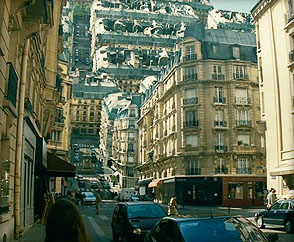
Or… not really, because Inception is at once Nolan’s most ambitious and most prosaic movie yet. In its settings (everywhere from Mombasa to Tokyo to a dream ice fortress in Canada) and its attempt to create whole universes of dream life from whole cloth, it’s epic all right, but when we finally enter the subject’s brain, we find a dusty collection of tropes borrowed from other genre entertainments. We get a little Grand Theft Auto with machine guns blazing and cars swerving into each other, a mountain assault that plays out like an unholy marriage of On Her Majesty’s Secret Service and Ghost Recon, and a few musings on reality vs. dream borrowed from The Matrix, Dark City and other virtual reality potboilers. “You can create anything you want,” Cobb says enticingly to Ariadne early on, but Nolan is too much of a control freak, too preoccupied with setting up plot movement like chess pieces on a big board, to let his imagination soar in the dream sequences and come up with something big, apart from coming up with bigger guns (as the quote up top demonstrates). There’s none of the tonal shifts, the non sequiturs, the sense of freedom and chaos that often infect a dream, and even Cobb and his team of infiltrators seem dour and earthbound, tied down by physical laws when they could be soaring in this universe, much like the characters do in Dreamscape, Satoshi Kon’s Paprika or even Nightmare on Elm Street. Gordon-Levitt gets to engage in a neat hallway battle in zero gravity that would have impressed Fred Astaire, and the amusing sight of several sleeping bodies tied together and floating down the hall holds the promise of more whimsical, deranged heights — it’s a pity the story never aims for them.
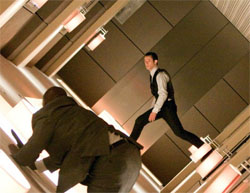
But it would be a mistake to completely dismiss Inception as another mindless blockbuster flick — even if Nolan doesn’t have the visionary nuttiness of a Philip K. Dick or David Lynch, there’s an aggressive intelligence in how he builds each dream layer (which all operate on different planes of time and reality) like a house of cards, and then unleashes a barrage of cross-cutting and parallel climaxes as it all gets shot to hell. Much like The Dark Knight, the fun comes from watching how pieces of action in different locales are all linked together. It may not stir the soul, and it may not stand up to repeat viewings — indeed, even after one viewing, there’s plenty of holes one can poke in the basic laws of dreaming that the film sets up — but it certainly gets the mind racing.
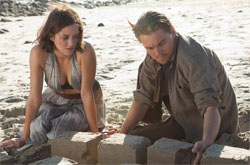
Amidst the bustling plot, all the actors acquit themselves well, even if they don’t have characters to inhabit — it’s fitting that we really only know them for the function they play, much like avatars in a video game (Tom Hardy as the brawling, wisecracking Eames comes off best). In the end, though, Inception is really about Cobb and his redemption… or is it? Without revealing the final image of the film, suffice it to say that Nolan leaves us with the possibility, however slight, that we may not be out of the world of dreams at movie’s end. I’m sure there will be entire tomes devoted to picking every frame of the movie apart and positing which levels occur in the “real world,” and already I’ve read an explanation that suggests that Cobb might still be in Mombasa.. but isn’t this beside the point? In effect, Inception is one big shell game, but for once, we get the sense that Nolan is aware this it’s all a game and not some Big Statement about existence and life as we know it, and he’s simply having fun flipping his shells around. Whether you enjoy it or not depends on your taste for street magicians.

